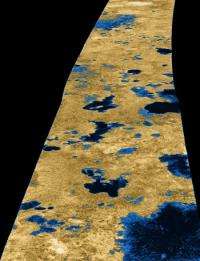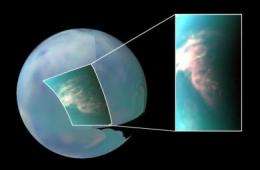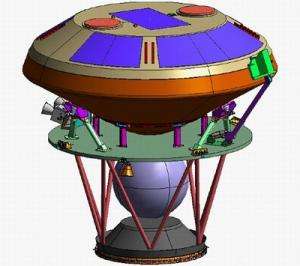Life Without Water?

On Saturn’s giant moon Titan, it is so cold that water is frozen as hard as granite. And yet there is a complete liquid cycle of methane and ethane. Scientists wonder whether there could also be life.
New discoveries have a way of messing with old definitions. Take, for example, the concept of a habitable world.
The standard definition of a “habitable world” is a world with liquid water at its surface; the “habitable zone” around a star is defined as that Goldilocks region - not too hot, not too cold - where a watery planet or moon can exist.
And then there’s Titan. Saturn’s giant moon Titan lies about as far from the standard definition of habitable as one can get. The temperature at its surface hovers around 94 degrees Kelvin (minus 179 C, or minus 290 F). At that temperature, water is a rock as hard as granite.
And yet many scientists now believe life may have found a way to take hold on Titan. Water may all be frozen solid, but methane and ethane are liquids. In the past few years, instruments on NASA’s Cassini spacecraft and images captured by ESA’s Huygens probe have revealed an astonishing world with a complete liquid cycle, much like the hydrologic cycle on Earth, but based on methane and ethane rather than on water.
“What Cassini actually found on Titan, from 2004 onwards, was a methane-ethane cycle that very much echoes the kind of hydrologic cycle we see on the Earth,” says Jonathan Lunine, currently at the University of Rome Tor Vergata while on leave from the University of Arizona. Cassini has revealed rivers and lakes of methane-ethane, the lakes evaporating to form clouds, the clouds raining hydrocarbons back down onto the surface, flowing through rivers and collecting in lakes. It is the only world in our solar system other than Earth where a liquid cycle like this takes place. There’s just no water.
But there are plenty of hydrocarbons. Methane and ethane are the simplest hydrocarbon molecules. By themselves, they are of limited biological interest. But hydrocarbons are versatile: they can assemble themselves into fantastically complex structures. Indeed, complex hydrocarbons form the basis of what we call life. So one has to wonder: has hydrocarbon chemistry on Titan crossed the threshold from inanimate matter to some form of life?
One thing is for certain: if there is life on Titan, it is not life as we know it. There is no way that terrestrial life could have originated or could survive on Titan. “DNA and RNA,” says Lunine, “form out of compounds that require oxygen and phosphorus, and there’s very little oxygen in the Titan system.” And the very structure of DNA depends on liquid water. “DNA forms a helix because of its water-loving and water-repellant ends.” So life on Titan “would have to find other molecules that carry information.” Moreover, because Titan is so cold, the amount of energy available for building complex biochemical structures is limited. But as Lunine points out, that’s not necessarily a showstopper. “We don’t have a lot of experience with the chemistry that might go on at these temperatures.” We don’t know what’s possible.

The chance to discover a form of life with a different chemical basis than life on Earth has led some researchers to consider Titan the most important world on which to search for extraterrestrial life. In a recent paper in the journal Astrobiology, Robert Shapiro, a professor of chemistry at New York University, and Dirk Shulze-Makuch of Washington State University rated Titan a higher-priority target for investigation than even Mars.
On Mars, and on Jupiter’s moon Europa and Saturn’s moon Enceladus as well, astrobiological efforts center on the hunt for water-based life. But such life, even if it is found, could have shared a single origin with life on Earth, getting started on one world and being transferred by meteorites to others. Not so for Titan. If there is life on Titan, it arose separately from life on Earth.
Not everyone agrees that Titan is the priority, though. NASA and ESA recently gave the nod to a Jupiter-system mission that will explore Europa as the next flagship mission to the outer solar system. It may be decades before another major mission flies to Saturn and Titan.
But a smaller-scale and less-expensive lander known as the Titan Mare Explorer (TiME) could launch as early as 2015, arriving in 2022 or 2023. Ellen Stofan of Proxemy Research in Rectortown, Va., the principal investigator for the TiME mission, described the lander as a buoy-shaped capsule that would splash down in one of Titan’s northern lakes and float across its surface for a minimum of two Titan days (sixteen Earth days).
“We have a number of instruments on board. The most important from a pure scientific point of view is a mass spectrometer,” Stofan said. “We’ll take basically a sip of [the lake] liquids, several times, and analyze them to really nail down their chemical compositions. We know there’s methane, we know there’s ethane,” but TiME would inventory more complex organic (hydrocarbon) compounds, as well.

If there is life on Titan, it may be difficult to detect. “I don’t expect you to go to these lakes and see beautiful filamentary structures made of cells that are macroscopic in size or easily seen,” says Lunine, who is a co-investigator on the proposed TiME mission. The clues could be subtle. “We would have to look for particular peculiarities in composition, hydrocarbons that are lacking that should be there, others that are more abundant” than expected.
No-one knows “what happens to organic chemistry in [Titan’s] environment,” Lunine adds. “Does it go to a kind of a chemistry that we can call life but works in liquid hydrocarbons? We don’t know the answer to that. But the answer is profound.” Because if the answer is yes, it means that the origin of life has taken place more than once. “If the answer is yes, then it says that life … must be a common outcome of planetary processes in the cosmos.”
If the answer is yes, it means we are not alone.
Source: Astrobio.net



















